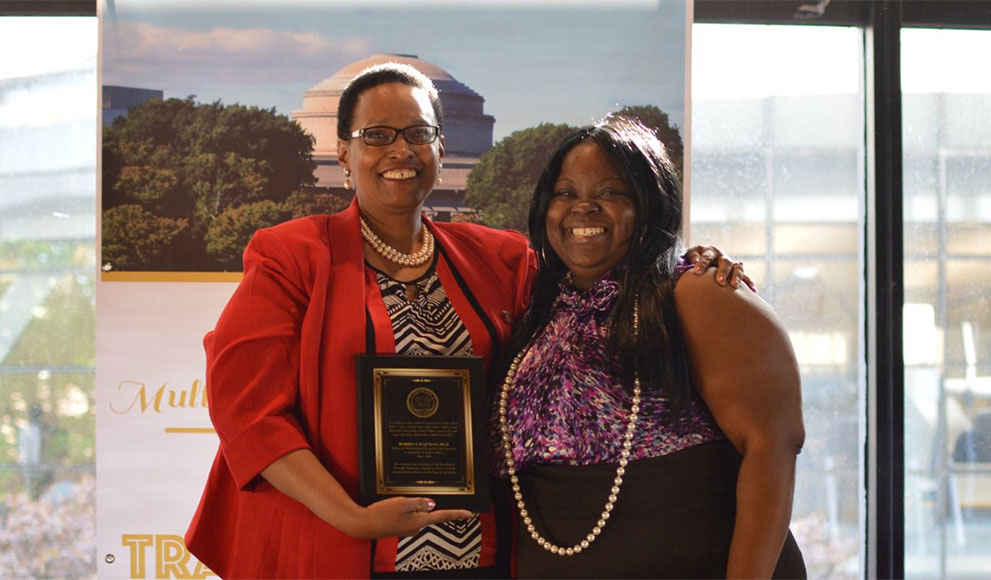MIT Honors Wellesley Associate Provost Robbin Chapman by Establishing an Excellence Award in Her Name

On May 11, MIT honored Robbin Chapman, Wellesley's associate provost and academic director of diversity and inclusion, and lecturer of education, with the naming of the Dr. Robbin Chapman Excellence Through Adversity Award. The award is given to a senior who demonstrates the excellence and leadership Chapman brought to her work as the first manager of diversity recruiting for MIT’s School of Architecture and Planning and the first assistant associate provost for faculty equity for the institute.
"I was thrilled and deeply touched by this honor, and by the opportunity to encourage a young leader," said Chapman, who earned her earned her S.M. and Ph.D. at MIT. "Having someone believe in you and your abilities is critical, and this award may inspire the recipient to continue inspiring others to make the fullest use of their time and talents."
Chapman began providing support and resources to undergraduates as a graduate resident tutor in MIT’s New House and Simmons dormitories. She taught mini-workshops during orientation about how to recognize and send affirmative micromessages and how to minimize unconscious biases. Throughout the school year, she also taught students how to convey ideas to people with a variety of communication styles—for example, helping a linear thinker communicate productively with someone who tends to branch off along various lines of thought.
Later, as an administrator at MIT, she led workshops and spoke at conferences on fostering inclusive behavior, and she established a lunchtime dialogue series where people from across the institute could discuss ways to engage effectively with one another as they worked toward creating a more just and equitable campus community.
The Dr. Robbin Chapman Excellence Through Adversity Award supports that goal. "Minoritized students leaders face a multitude of challenges—financial, familial, academic, mental health, etc. It is important that we celebrate them when they excel despite the challenges," said La-Tarri M. Canty, director of multicultural programs at MIT. "They also need to hear the stories of those who came before them. Dr. Chapman has created a legacy for herself."
Chapman explained, "Being African-American in a predominantly white institution, I experienced the same systemic barriers and challenges that are seen across higher education. Those included isolation, marginalization of my course and lab work, expectations of intellectual inferiority, and deficits in mentoring."
Since coming to Wellesley in fall 2011, Chapman has drawn on those experiences as she works with colleagues to create a more inclusive campus environment. "When it comes to communities, our best work is done together," she said. "Through community engagement and organization, we develop new leaders and build capacity to address new issues in the future. Through our shared experiences, perspectives, and concerns we build coalitions and create the synergies for sustainable change."
Chapman began the Partnerships for Diversity and Inclusion’s Actualizing Equity Learning series, which identifies tools for positive change within the Wellesley community. The theme of the series this year was "privilege" and, among other events, featured a lecture by journalist Callie Crossley '73.
Chapman also started the Inclusive Community Grants Program, which provides mini-grants to staff, students, and faculty for programs and activities that will foster an inclusive campus climate. For example, Laura Adamczyk, director of parent and family programs, received a grant to support a workshop for parents of incoming first-years that gave them a taste of what their daughters would be learning regarding cross-cultural communication.
Chapman said women, first-generation college students, people of color, and members of other non-privileged groups often assume that people who succeed are superheroes or have some magic formula. She highlights the non-linear nature of success and how to be resilient in the face of failure. In reality, she said, everyone fails, and failure teaches important lessons. Chapman, along with Elizabeth Oakes, senior instructor in chemistry, stresses that concept in a biochemistry boot camp, called Biochemistry Research Week, which is offered in collaboration with Harvard University each Wintersession to increase the number of underrepresented students in STEM majors.
"Participants say it is amazing to hear mentors say, 'I fail often, but this is what I do when I fail,'" said Chapman. "Any successful researcher fails much of the time; that is the path to insight and innovation."
In all of her work, Chapman tries to help the Wellesley community understand intersectionality, or how different groups interact with people of various identities. An issue involving women, for example, may be viewed one way by a white woman, another by a Latina, and a third by an African-American woman. Understanding that complexity is necessary to building greater understanding, and a stronger College.
"The most powerful engine of social change is an educated young woman," Chapman said. "In an increasingly diverse Wellesley, we move toward greater excellence in our mission. When we are able to bring our full selves to Wellesley, the world will truly experience the full benefit of the Wellesley Effect."
